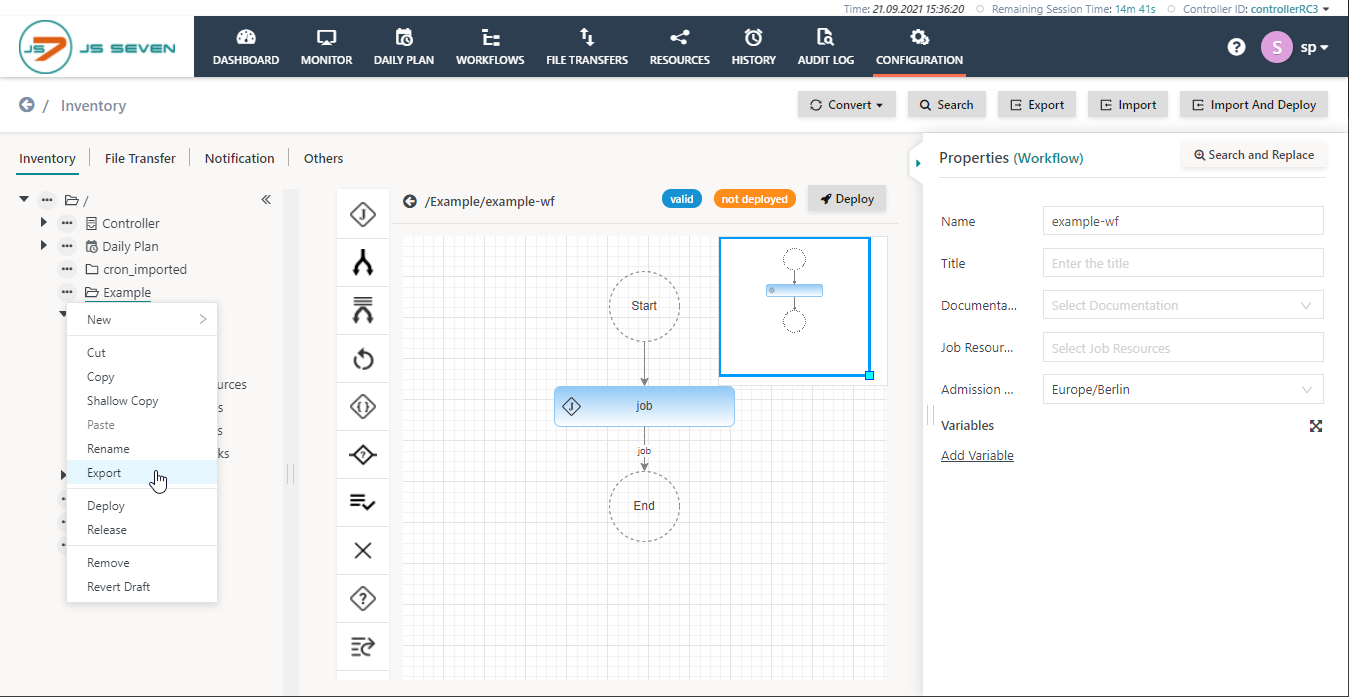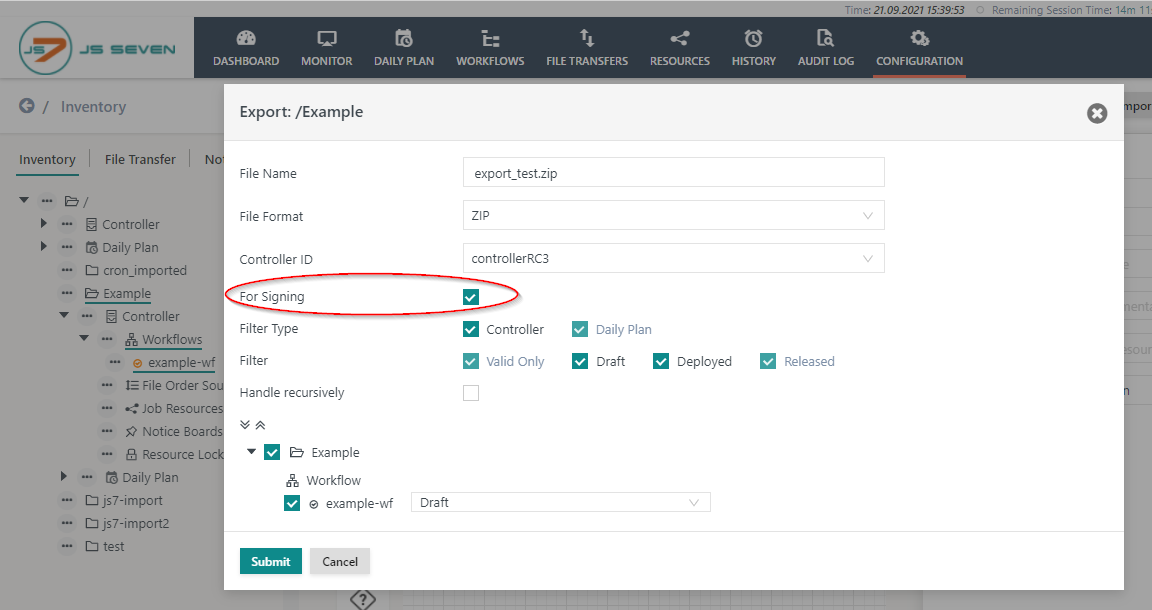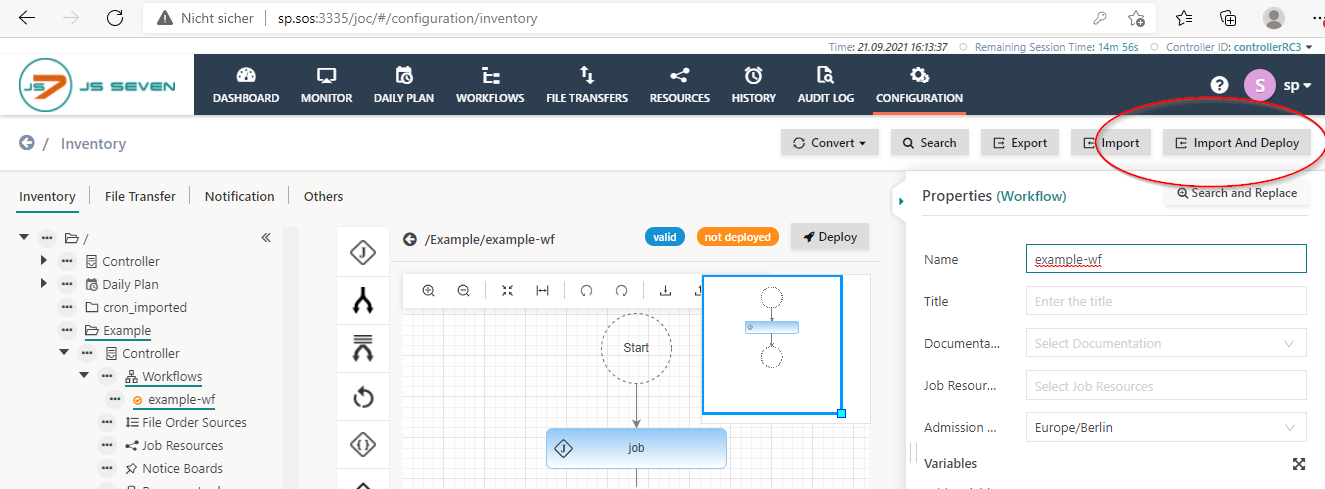Introduction
Prerequisites
Required: User Signing Certificate
Each user with the permission to deploy has to add his X.509 signing certificate to JOC Cockpit.
Optional: Root CA Certificate
In addition, the X.509 certificate of the Root CA that signed the user's signing certificate can be added to JOC Cockpit. There is a single Root CA certificate for all user profiles.
- Any user signing certificates have to be published to the Controller and Agents. Certificates are stored to the
config/private/trusted-x509-keysfolder of Controller and Agent installations. - If a Root CA certificate is present in JOC Cockpit, then it is sufficient to add the Root CA certificate to the
config/private/trusted-x509-keysfolder of Controller and Agent installations.- No further user
signingcertificates have to be added to the Controller or Agents as long as the user signing certificates were created by the given Root CA. - This mechanism implies that any user signing certificate signed by the same Root CA certificate will be accepted.
- Users who do not wish to use this implicit mechanism should not add the Root CA certificate to Controller and Agents but should add individual user signing certificates only.
- No further user
Deployment Process Overview
The user has to export the desired configuration of scheduling objects with the Export operation available from the Configuration view.
- Deployment tasks include to
export scheduling objects with the checkbox "for Signing" checked to an archive file (.zip).
- unpack the exported archive
- The archive contains a
meta_inffile and the configurations.
- The archive contains a
- sign the configurations and store the signature - base64 encoded - in the same folder.
- Each signature file has to use the same name as the original configuration with an additional filename extension.
- for RSA/ECDSA signatures use the filename extension ".pem" or ".sig" respectively.
- for PGP signatures use the default filename extension ".asc".
- pack the archive once again to add signature files and make sure the
meta_inffile is still available with the root folder of the archive. - upload the archive using the Import And Deploy button.
Example
Export
- Click Export either in the context menu of the folder to export or from the button in the top right corner:
- In the Export pop-up window check the checkbox "for Signing":
- Select the scheduling objects to deploy.
Signing
Extract the configuration from the archive and preserve the folder structure of included scheduling objects:
Signing the configuration
For this example, we use OpenSSL to sign the configuration file:
openssl dgst -sha256 -sign c:\tmp\sos.private-ec-key.pem -out c:\tmp\example-wf.workflow.json.sha256 c:\tmp\example-wf.workflow.json
-sha256- the signer algorithm
-sign c:\tmp\sos.private-ec-key.pem- the private key file to sign the content of the original configuration file
-out c:\tmp\example-wf.workflow.json.sha256- the path to the output file
- the file contains the binary representation of the signature
c:\tmp\example-wf.workflow.json- the path to original scheduling object file (workflow)
- the path to original scheduling object file (workflow)
openssl base64 -in c:\tmp\example-wf.workflow.json.sha256 -out c:\tmp\example-wf.workflow.json.pem
base64- OpenSSL switch to encode base64
-in c:\tmp\example-wf.workflow.json.sha256- the newly created binary signature file
-out c:\tmp\example-wf.workflow.json.pem- the base64 encoded text signature file according to the JOC Cockpit deployment naming convention
Copy the newly created text signature file to the same folder as the scheduling object file.
Pack the archive once again or add the file to the existing archive.
The exported archive contains the meta_inf file. This file does not have to be signed. Make sure the file is present in the root folder of the target archive.
Import/Deploy this archive with the Import And Deploy function of JOC Cockpit:
Enter the signature algorithm using the default Java names for the signature algorithm:
Supported signature names include
| OpenSSL | Java with RSA | Java with ECDSA |
|---|---|---|
| sha512 | SHA512withRSA | - |
| sha256 | SHA256withRSA | SHA256withECDSA |
During import, the scheduling object configuration and the signature from the archive will be forwarded to the Controller and will be validated. After successful validation by the Controller and by the Agent the scheduling object is deployed.






